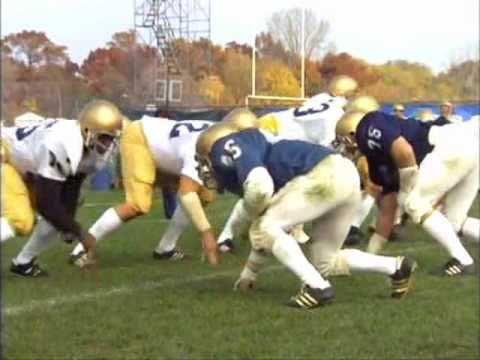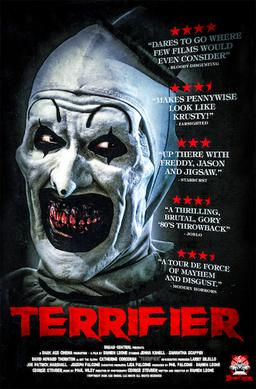Rudy (1993) review
- Jeremy Kelly
- Jan 9, 2023
- 5 min read
Updated: Jan 9, 2023
Rudy (1993)
Directed by: David Anspaugh
Produced by: Robert N. Fried, Cary Woods
Screenplay by: Angelo Pizzo
Starring: Sean Astin, Ned Beatty, Charles S. Dutton, Lili Taylor, Robert Prosky

Well, we just capped off an exciting final week of the NFL season—nevertheless diluted by the ongoing topic of Damar Hamlin’s devastating injury; but before the playoffs start, we’ve got the class of the collegiate gridiron level in tonight’s College Football Playoff National Championship between the No. 1 ranked Georgia Bulldogs—looking to become back-to-back champions—and the No. 3 ranked TCU Horned Frogs, who haven’t brought home the hardware since 1938, back when their quarterback was Davey O’Brien and the NFL had teams like the Brooklyn Dodgers and Pittsburgh Pirates. So I figured today I should review a movie about college football, as I’ve already done ones about pros and high school kids; eh, let’s make it easy on myself and talk about “Rudy.” Based on the true story of Daniel “Rudy” Ruettiger (Sean Astin), an undersized, talent-deficient walk-on who achieved his dream of playing football for the University of Notre Dame, this movie is shamelessly uplifting and inspiring, and I mean that in the best possible way.
Growing up in Joliet, Illinois, Rudy has always wanted to play for the Notre Dame Fighting Irish; but poor grades, lack of money and a relatively meager physical stature have kept it a far-off fantasy, despite a relatively successful high school career. Afterwards, he goes to work in a steel mill with his father Daniel (Ned Beatty) and brother Frank (Scott Benjaminson), where Rudy’s best friend Pete (Christopher Reed) dies in an accident; days later, he visits Notre Dame and speaks with local priest Father Cavanaugh (Robert Prosky), who helps get him enrolled at nearby Holy Cross College. While aided by teaching assistant Dennis, a.k.a. “D-Bob” (Jon Favreau), to make the grades necessary to transfer to Notre Dame, Rudy works with Fortune (Charles S. Dutton), the head groundskeeper at Notre Dame Stadium, and sleeps on a cot in his office. He’s eventually able to transfer, and becomes a part of the Fighting Irish practice squad, preparing the team for their games but never dressing for them. Nevertheless, his tenacity gains the respect of head coach Ara Parseghian (Jason Miller) and the players; but will it be enough to get him a chance to run out onto the field in uniform?

Sean Astin has earned a couple of iconic roles depending on what generation you were born into, whether it’s as Mikey in “The Goonies,” Samwise in the “Lord of the Rings” trilogy or nowadays as Joyce’s boyfriend Bob on “Stranger Things.” As Rudy, he provides the perfect amount of rugged determination for a likeable underdog. We believe his moments of hope, despair, resolve, discouragement and enthusiasm, even if the latter comes out in occasionally awkward ways. Does he really think Fortune is going to be impressed by him running around the field and going “The 40! The 30!” or his drunken prattling to strangers in a bar will make him new friends? I’m always a little confused by exactly what tone these scenes are supposed to be going for; are we supposed to be charmed by just how boundlessly passionate he is, or somewhat put-off because it’s so fanatically cringey? However, I can totally see aspects of this character, surrounded by something he’s spent his life dreaming about, as sincere. By the way, Astin has a pretty interesting life story about his parentage; look it up if you haven’t.
The supporting characters don’t get a ton of focus, but there is a satisfying idea of how each of them leaves an impact on Rudy. They’re all played by dependable talents like Charles S. Dutton, Robert Prosky and Ned Beatty, or future talents like Jon Favreau in his first major film role as D-Bob; it was here where the latter met his friend Vince Vaughn, who plays disgruntled halfback Jamie O’Hare. The most interesting character is Fortune, who doesn’t want to let on how much Rudy’s optimism affects him, but subtly finds ways to give him motivation. There’s also Jason Miller as Parseghian, a legendary coach who won two national championships in his tenure at Notre Dame, and now finds himself starving for players with Rudy’s heart. With the exception of probably Frank, nobody goes too over-the-top; most of these figures in Rudy’s life are supportive, but also so intent on sparing his feelings that it comes across as condescending, though not to an asshole degree.

So while the Holy Cross scenes are certainly effective just at selling how much Rudy is sacrificing, to me it’s just the warmup to the real story when the football action starts. The energy and impact of every run, hit, throw and catch is conveyed magnificently in the editing and music, scored expertly by Jerry Goldsmith, who had previously been the composer on “Hoosiers.” In fact, the movie’s sort of a “Hoosiers” reunion; director David Anspaugh and screenwriter Angelo Pizzo had the same jobs there too. The former actually made the choice to film the football scenes with an off-field camera, just like a real television broadcast, and it really helps keep the action crisp and clean. The cinematography by Oliver Wood is generally solid; I always remember the tracking shot that goes through the locker room while Rudy is with the booster club. As the film goes on, it’s easy to become enraptured by Rudy’s drive and how it reflects in his teammates, which culminates in a sequence of cinematic events that will test your emotional fortitude.
I don’t care if it’s cheesy or factually questionable, I always get chills in just how moving and powerful the ending is. If the film really wanted to trash reality in favor of creative license, the climax would’ve featured Rudy scoring the winning touchdown in the final seconds, which would’ve made no sense. The story isn’t about winning, nor is it even really about football; it’s about earning your chance to get in the game, and if you’re righteous and true in your endeavors, you can take pride in them at the end of the day. I know there’s a certain cynicism to the Fighting Irish among college football fans, that they’re over-exposed yet supposedly still a top program despite them not winning a title in 35 years. I’m not here to convince those people they’re wrong, but when there’s an ardor for something that feels genuine, it can be enthralling to witness, and it’s completely on display here; it’s the first movie shot on the Notre Dame campus since “Knute Rockne, All American” in 1940. “Rudy” is a beloved sports film for good reason; it’s a testament to anyone who wants to do something they love, no matter what the odds.
My rating: 9.5/10





Comments